The time to win is now. That is the message the Calgary Flames are sending after signing Matthew Tkachuk to a highly-anticipated contract on Wednesday.
Tkachuk put pen to paper on a three-year, $21 million agreement, ending the standoff between the left winger and the National Hockey League club. The 21-year-old restricted free agent (RFA) was without a contract after his three-year, $5.325 million entry-level rookie contract expired June 30.
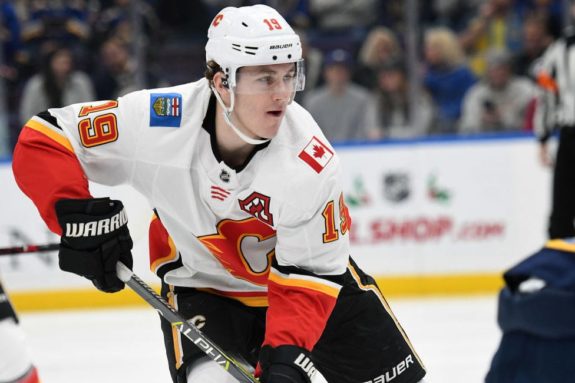
The agreement between Flames’ general manager Brad Treliving and Tkachuk on a bridge contract means the Flames do not have to trade one of their higher-salaried players to get under the NHL’s $81.5-million salary cap ceiling. Concerns in Calgary were that a valuable contributor would be moved in order to retain the services of Tkachuk. Defensemen T.J. Brodie and Travis Hamonic, along with right-winger Michael Frolik were three names making the rumor mill of trade candidates.
All of Treliving’s moves have gotten the Flames to this high point. The four highest-salaried players of the squad (Tkachuk, Mark Giordano, Johnny Gaudreau, and Sean Monahan) are all under contract until at least 2021-22. None of the regular players were moved. But the window to win with the current Flames’ lineup could close tight after 2022, as Gaudreau and Giordano will be unrestricted free agents (UFA), and Tkachuk will be an RFA. Monahan becomes an UFA in 2023. The creep of a closing window could begin as early as next season – from the current roster, there will be seven UFAs and four RFAs after this campaign and two UFAs and three RFAs the next.
Flames Barely Get Under Salary Cap
The Flames are now up against the salary cap for 2019-20 and don’t have any room to wriggle – in fact, the team is projected to be $658,375 over the cap. The likely solution is to have a player on a two-way contract who is waiver-exempt to begin the season with the Stockton Heat of the American Hockey League (AHL). Second-year forward Dillon Dube seems to be the logical candidate over the only other player who fits that criteria – rearguard Oliver Kylington – because the Flames are anticipated to start the season with their 23-man roster comprising of 14 forwards, 7 defensemen and 2 goaltenders. The season-ending loss of defender Juuso Valimaki in July tilts the needle of need toward carrying a spare defenseman.
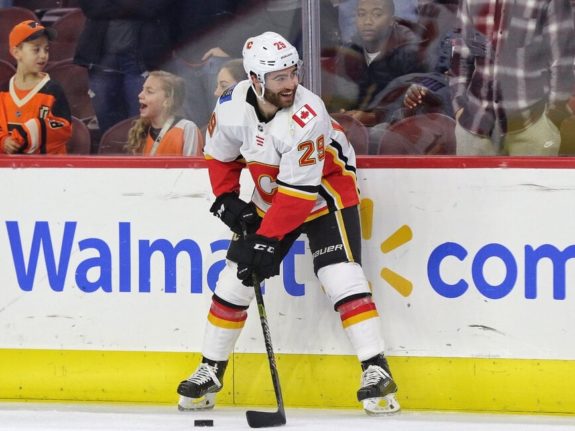
Another short-term implication to the Flames roster is that a player on a professional tryout is now less likely to sign because of the team’s cap-crunch unless it was for the league minimum of $700,000. After clearing waivers, the player would be sent to Stockton as some added depth. Ex-Oiler forward Tobias Rieder could fit the bill.
Minor Tweaks Now for Pacific Division Champs
For the most part, the Flames will look much like the defending Pacific Division champions that fell to the underdog Colorado Avalanche in the opening round of last season’s playoffs. Notable losses are veteran goalie Mike Smith and underperforming winger James Neal to the Edmonton Oilers, and hard-nosed winger Garnet Hathaway to the Washington Capitals. Particular additions to the Flames are two former Oilers – left-winger Milan Lucic and veteran goalkeeper Cam Talbot.
Treliving admitted the Tkachuk contract was not exactly what he had hoped for, confessing that all general managers are looking for the longest deal for the least amount of money. But his main priority was inking Tkachuk while retaining the current lineup, and contract talks reflected that desire by both parties.
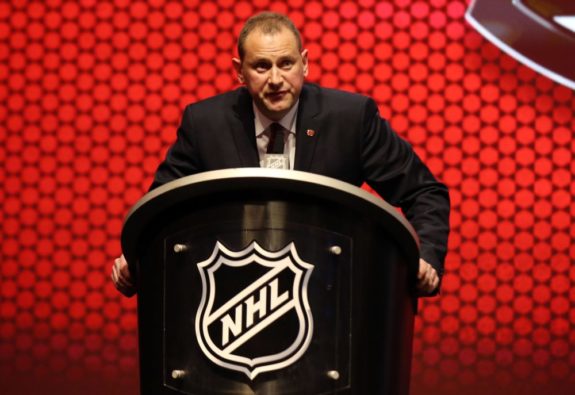
“As we were going through this process, we really only had two goals in mind this summer,” Treliving explained to a media gathering at the Scotiabank Saddledome in Calgary. “When you complete the season and sort of do your debriefing and then you come back and try to put together a plan for the summer, our two goals for the summer were number one to sign Matthew and number two was to keep our team intact.”
No Flames Need to Go
“What we wanted to eliminate was a distressed transaction, where we were in a situation where you had to throw a body under the tarmac to create space and it comes with challenges and it comes with, potentially, risks. We talked at length at the beginning of the process to Matthew and his representatives and I can tell you from the start, as you go through this process, Matthew’s goal was the same. He obviously wanted to get his situation resolved, but it could not, would not, and did not result with the elimination of a teammate. That’s what Matthew said to me at the beginning of the process and it goes again to the type of individual that we’re dealing with here.”
Tkachuk agreed to a lesser term than did his counterparts Mitch Marner and Auston Matthews of the Toronto Maple Leafs, who both signed their second contracts for longer terms with larger yearly cap hits. Marner signed for six years at $10.83 million per season on Sept. 13, while Matthews signed a five-year, $11.63 million per season contract in February. A shorter deal for Tkachuk allowed the Flames to maneuver under the salary cap without moving a one-way contract.

Tkachuk’s contract breakdown is similar to those of other three-year RFA contracts completed recently by players coming off of their rookie deals. The Flames will pay their alternate captain $21 million – $5 million this season, $7 million the next and $9 million in the final year, averaging $7 million per year. On Monday, the Tampa Bay Lightning signed Brayden Point to a three-year, $20.25-million agreement averaging $6.75 million ($5.25M, $6M, $9M), and the Vancouver Canucks inked Brock Boeser for $17.825 million over three years, averaging $5.875 million ($4M, $6.125M, $7.5M). Patrik Laine agreed Friday to rejoin the Winnipeg Jets on a two-year contract for $13.5 million, averaging $6.75 million ($6M, $7.5M).
It is clear to anyone who follows the Flames that expectations are high and will remain high as long as the stars remain together, supported by a quality cast. The organization, management, coaching staff, and players are echoing those sentiments loud and clear.
Bill Peters Thrilled With Tkachuk Signing
“It’s good to have him back in the fold, I’m glad it’s over with. I thought both sides did a great job,” said a beaming head coach Bill Peters, “and I’m happy we won’t have to do it for probably three more years. We’ve got a young team when you look at our core, when you take [Giordano] out of it – he’s young and fresh, thankfully, so he’s good – but all those other guys 25, 26, 24 – you haven’t peaked at 24, if you have, shame on you – and I know they’re going to work hard to max out their potential and I think there is room to grow.”
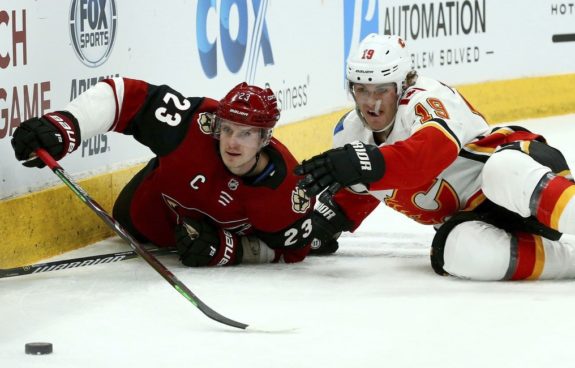
Tkachuk was feeling all the love from all corners from the moment his flight touched down at the Calgary International Airport. Fans recognized the popular left winger and he told of their well-wishes as he prepared to depart for the Saddledome and the life-changing moment of becoming the highest salaried Calgary Flame ever. The love continued at the home of the Flames.
“I got to speak with Murray [Edwards] a little bit this morning and his commitment to winning – you don’t see him here a ton – but the more tines I talk with him the more you see his commitment to bringing a Stanley Cup here,” said Tkachuk about the Flames co-owner. “That’s a big, big reason why I’m sitting here today. I’m excited to be here.”
The 6-foot-2, 204-pound American elaborated on how the deal came together, all while displaying his leadership skills by scoring points with his bosses, fans and teammates.
“The plan from the start – we were kind of looking at every option – but, you know, long-term was kind of preferred from the start and wanting to be here as long as possible and being a Calgary Flame,” he explained. “We thought that was going to be the way to get it done at the start, but talking with [Treliving], and obviously getting feedback, and we knew the whole cap room and everything, and we both came to the conclusion right before camp that a three-year deal was going to work best for the team, so the best-case scenario happened – where not one guy had to be moved in this process… that was a fear, you never want to see that happen.
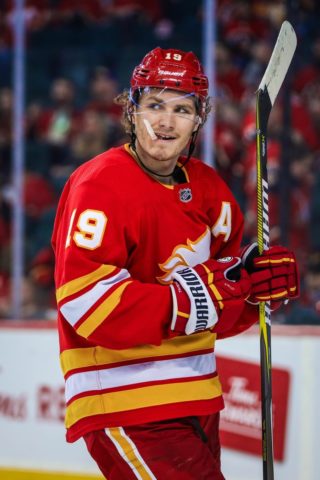
“We were a 100-point team last year in the regular season and basically everyone’s back, so we’re chomping at the bit. Having the finish that we had last year made it more clear to me that I want to win with this group. I want to win in Calgary. And this is ultimately why I chose the three-year path. We could have argued over the long-term/short-term but coming down the stretch we knew this was going to work for both of us – both myself and the team. I’m very happy with how it ended – very, very happy – and excited to get on the ice tomorrow.”
Common Goals Led to Agreeable Solution
Treliving knows his tenure as Flames GM is based upon on-ice success and shrewd deal-making. Both are intrinsically tied together. So, achieving his goal of keeping the band together is in everyone’s best interest, except for the competition.
“Everybody thinks you just go in and start arm-wrestling over numbers, you talk about what’s important and the first thing on both sides is Matthew wants to be here, wants to play his career here, he wants to sign here as long as he can sign here and that was our goal and mission at the beginning,” he said. “At the end of the day, Matthew and I talked and said ‘how do we win?’ When you explain: ‘this allows us… you’re allowed to get back to the trough in three years, his goal was how do we keep this group and how do we add to this group and how do we win with this group?’ It’s important to realize that’s how we get to the term we got to, not necessarily of saying ‘I don’t want to be here long-term’. We spent days, hours and months talking about long-term.”
Demonstrating his typical candor, “Chucky” was forthcoming in elaborating on how his perspective had changed about the term-length of a new deal.
“We had such a great team last year and we brought in some pieces that made us that much better and can be more successful in the post-season, so it was just a bonus that nobody… that everyone’s still here,” said Tkachuk. “These are the guys I’ve played with for three years that have made it so much fun to come to the rink every single day, on and off the ice, so that was a big part. Once that was kind of brought up to me – I didn’t really think about that too, too much until maybe late August, and once that idea was brought up, I was really intrigued and wanted to do it because I knew it could benefit both sides.”
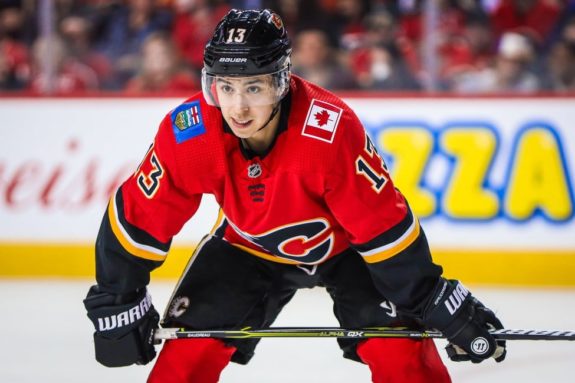
Treliving can take a breath – his team is intact as he had hoped and planned. But he knows rosters are fluid and circumstances will determine the moves he may or may not make as the season progresses.
“You’re never done, right? You’re never done,” he emphasized. “Nobody hits the lights and says ‘we’re shutting down.’ We’ll continue to work at it, but this was the big piece of business that needed to get done. We continue to look at ways to get better and like I said, do it in a manner where I don’t feel we are a distressed seller.
“We’re excited about the young players. I call them young pro’s. Matthew’s still a young player – he turns 22 in December – that’s still a young man. He’s got three years in the league and is a top player in the league. He’s a top player at his position in the league. You look at Gaudreau and Monahan. You look at Giordano… we like the group that we have. We’re able to keep it together and the goal now is – having said all that – we weren’t good enough at the end of the year. I mean, we didn’t accomplish what we wanted to accomplish, so the goal isn’t staying the same. The goal is to get better. Now we were able to do that with the group. Now keep this group together and we’ll continue to look at ways to add to it.”
Everything may appear quite wonderful in Flamesville right now – a happy fraternity of brothers reunited while an adoring fan base envisions warm spring-night celebratory marches along the Red Mile. But Treliving cannot rest. Well, maybe just a little, for now.